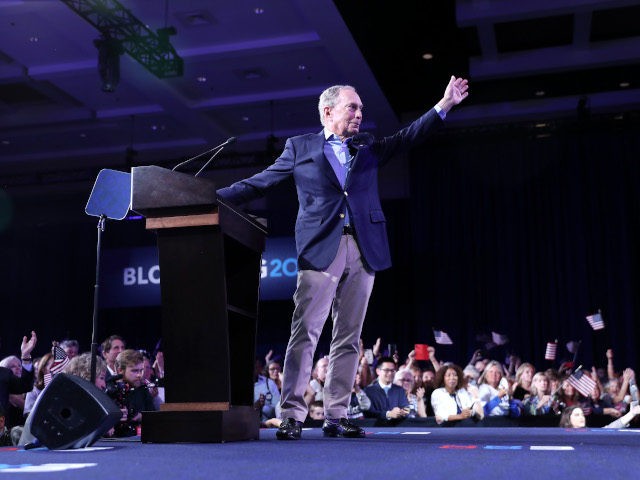Former New York City Mayor Mike Bloomberg on Wednesday dropped out of the Democrat presidential primary and endorsed former Vice President Joe Biden.
Bloomberg, who spent over $600 million of his own money on his failed bid, conceded that he no longer envisioned a path to his party’s nomination following a poor showing on Super Tuesday.
“I’m a believer in using data to inform decisions. After yesterday’s results, the delegate math has become virtually impossible – and a viable path to the nomination no longer exists. But I remain clear-eyed about my overriding objective: victory in November. Not for me, but for our country. And so while I will not be the nominee, I will not walk away from the most important political fight of my life,” Bloomberg said in a statement. “I’ve always believed that defeating Donald Trump starts with uniting behind the candidate with the best shot to do it. After yesterday’s vote, it is clear that candidate is my friend and a great American, Joe Biden. I’ve known Joe for a very long time. I know his decency, his honesty, and his commitment to the issues that are so important to our country – including gun safety, health care, climate change, and good jobs.”
Bloomberg’s exit from the race comes after only winning the territory of American Samoa and collecting a total of 44 delegates in several other primary contests. In contrast, Biden continued his comeback with wins in Texas, North Carolina, Massachusetts, Alabama, Arkansas, Minnesota, Oklahoma, Tennessee, and Virginia. Former Sen. Bernie Sanders (I-VT) won his home state of Vermont, California, Colorado, and Utah. As of Wednesday morning, the results in Maine are not yet final.
Speaking to Axios, one unnamed Bloomberg campaign official said Rep. Jim Clyburn’s (D-SC) endorsement of Biden, paired with exits by former South Bend, Indiana, Mayor Pete Buttigieg and Sen. Amy Klobuchar (D-MN), gave the former vice president a substantial boost in recent days.
In the early weeks of his campaign, Bloomberg used his vast fortune to introduce himself to voters outside New York on his own terms, and his rivals accused him of trying to buy the party’s nomination and the White House. As voting drew closer, the former Republican was forced to confront his Democratic rivals head-on by appearing alongside them on a debate stage. His first performance was shaky and uneven and caused voters to view him with a more critical eye.
He proved unable to overcome consistent criticism of New York’s use of the stop-and-frisk police practice under his tenure as mayor, which disproportionately targeted young black and Latino men for searches aimed at finding weapons. The practice ended after a federal judge declared it unconstitutional, and Bloomberg apologized for using it weeks before announcing his presidential run.
He similarly faced pointed criticism — primarily from rival Elizabeth Warren — about the treatment of women at his company, Bloomberg LP. Under pressure from Warren, he said in mid-February he would release three women who sued him for harassment or discrimination complaints from confidentiality agreements. Women who worked for Bloomberg were featured in a commercial praising Bloomberg’s and the company’s treatment of women, and his longtime partner Diana Taylor defended him as a champion of women.
Bloomberg was dogged by accusations he was trying to buy the Democratic presidential nomination. His vast fortune proved a perfect foil for Sanders, who has said billionaires should not exist at all. Indeed, Bloomberg had a vast circle of influence from his spending on key causes like gun control as well as his philanthropic efforts to boost American cities and provide leadership training for mayors. Dozens of prominent mayors rallied behind his candidacy.
The Associated Press contributed to this report.

COMMENTS
Please let us know if you're having issues with commenting.